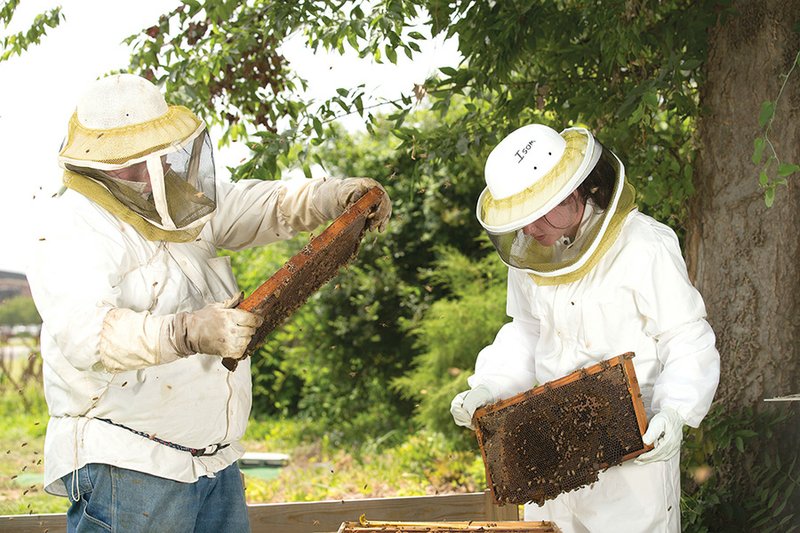ARKADELPHIA — On Tuesday night, the Master Gardeners of Clark County held a session at the fairgrounds in Arkadelphia. The event wasn’t about flowers or shrubs, and it was more a pep talk and a recruitment pitch to join up and help ease a national crisis by keeping bees.
Nationally, the population of honeybees is falling, said Jon Zawislak, an apiculture (beekeeping) specialist and instructor with the University of Arkansas Cooperative Extension Service.
“There is a disease attacking the honeybees in this country, along with some other factors that are creating a shortage of pollinators,” said Zawislak, who addressed the Tuesday-evening meeting. “The bee population in Arkansas has not been impacted as much as in some other states because the majority of beekeepers in the state are hobbyists.”
He said that the “hardest losses” are found in the hives of professional
beekeepers who move their beehives around to pollinate different crops though the year. That moving increases the chance for exposure of the bees to diseases, parasites and pesticides — all of which can endanger the hives.
“For a hobbyist, a loss of 30 percent of his bees would be not fatal to his hives,” Zawislak said. “For a professional with, say, as many as 50 hives, it would have a major financial impact.”
Amy Simpson of the Clark County Cooperative Extension Service said the Master Gardeners held the Beekeeping 101 class Tuesday for people interested in keeping bees as a hobby.
“The Master Gardeners like to do a spring seminar, and beekeeping is a hot topic,” she said. “With the decline in the bee population, keeping bees is one of the fastest-growing hobbies. This is all about getting started and the supplies you need.
“Bees are an important part of gardening. Vegetables will not be right if they are not pollinated enough. And it’s a neat thing to do. Bees make food, and it’s hot right now to have something you have had a hand in from garden to table.”
Zawislak said honey production is considered a cottage food industry, and the honey gathered from a person’s own hives can be used at home or even sold without health inspections or a lot of food regulations.
“It is a food with a very low risk of contamination, with a high sugar content; it’s dry and acidic,” he said. “It is a sterile food that is also good to use on wounds or burns.”
The bee-culture expert also said beekeepers can sell their excess honey without food inspections, but there are restrictions.
“[Honey] can be sold direct to the consumers from the farm,” Zawislak said. “It can also be sold from a farmers market, but if production is larger and sold through a store or online, there must be food-safety inspections.”
Honey is sold by weight, not volume, because it is classified as a food, he said. It is also heavy.
“A pint jar [of honey] weighs a pound and a half,” Zawislak said. “It is usually sold in 4-ounce, 8-ounce or pound bottles.”
Some people interested in getting into beekeeping might suffer some “sticker shock” because of the start-up costs, he said.
“It can cost from $300 to $500, but that is not any more expensive than starting to play golf or [buying] new fishing equipment,” Zawislak said. “The difficult part right now is finding bees. They are in high demand and short supply right now.”
Now and into early summer is the major honey-making time. Zawislak said a new beehive would have to be fed by its owner if the bees were being established in a new home at this time. However, he said, someone starting beekeeping now would have a well-established and productive hive by next spring.
An average hive produces 75 pounds of honey per year. Honey is harvested from May and into early June, Zawislak said. Usually, beekeepers will let the bees keep any honey made later in the year to sustain the hive during the winter.
Simpson said she was not aware of many beekeepers in Clark County, so the Master Gardeners were hoping Tuesday’s class would inspire some people to get interested in the hobby.
Zawislak said most of Arkansas’ beekeepers are in the Delta region.
“There are not many in southwest Arkansas because of the dense forests in the area,” he said. “There is an active club in Hot Springs. I hope some people will get interested and will read up on bees and get started.”
A botany student in college, Zawislak said he became interested in bees while a student.
“I was helping a professor in his gardens and learned about honeybees and fell in love with them,” he said. “I went back to college and became an apiculture specialist. I think the two subjects, plants and bees, complement each other really well. It is always different from one year to the next.”
Zawislak heads a program created by the University of Arkansas Cooperative Extension Service in Little Rock to promote beekeeping as a hobby and an industry. For more information about beekeeping, call him at (501) 671-2222.
Staff writer Wayne Bryan can be reached at (501) 244-4460 or wbryan@arkansasonline.com.
